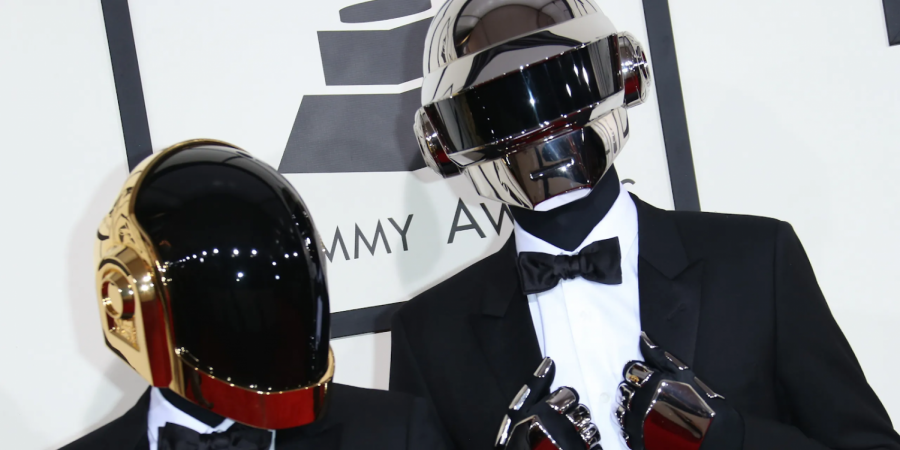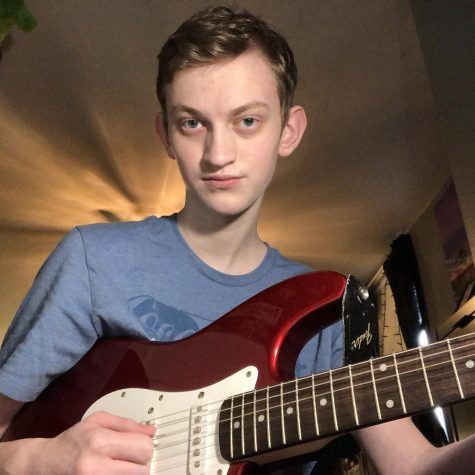Daft Punk: A Robotic Legacy
March 15, 2021
In 1993, Guy-Manuel de Homem-Christo and Thomas Bangalter formed the electronic music duo known as Daft Punk in Paris, France. Since then, the duo has made music history with their electronic, disco, and French house tunes, all while disguised as robotic figures (Bangalter in silver and de Homem-Christo in gold). In February, Daft Punk announced their breakup after 28 years. The duo hadn’t released an album since 2013, but the music world was still surprised. With such shocking news from such a legendary music duo, it would only be fitting to remember the many projects Daft Punk has produced and partaken in over the course of their career.
Daft Punk’s debut studio album, Homework, was released in 1997. This techno house album holds some of the duo’s most famous songs including “Da Funk” and “Around the World.” Homework boosted Daft Punk’s popularity with the help of the French house movement. “Around the World” hit number 61 on the Billboard Hot 100 list. Four years later, Daft Punk released their most critically-acclaimed studio album, Discovery. The album is notable for its ingenious utilization of sampling throughout its many tracks. “One More Time” from Discovery became one of Daft Punk’s most popular songs of all time. The post-disco album also brought other widely famous singles, including “Harder, Better, Faster, Stronger,” “Something About Us,” and the guitar-heavy instrumental track, “Aerodynamic”.
Human After All was released in 2005 as Daft Punk’s third and perhaps least-acclaimed studio album. The album’s backlash was due to its many repetitive tracks. Nonetheless, the album’s songs “Robot Rock”, “Technologic”, and the title track, “Human After All,” climbed international charts. Human After All was nominated for the 2006 Grammy Award for Best Electronic/Dance Album. In 2013, Daft Punk’s final studio album, Random Access Memories, was released. The album was a switch to a more ballad, soft rock-focused style and included the duo’s most famous song, “Get Lucky,” featuring Pharrell Williams and Nile Rogers. Random Access Memories also includes collaborations with other artists such as Giorgio Moroder, Paul Williams, Todd Edwards, and The Strokes’ Julian Casablancas. Daft Punk won four Grammy Awards for the album including the 2014 Grammy Award for Album of the Year.
Apart from Daft Punk’s four main studio albums, the duo has worked on countless other projects. They composed the musical score for the 2010 film Tron: Legacy, which was nominated for Best Score Soundtrack Album for Visual Media. Daft Punk has also released multiple remixes and live albums over the years. The duo has collaborated with Kanye West multiple times, including the co-production of West’s 2013 album Yeezus. Daft Punk was featured on two singles by The Weeknd (“Starboy” and “I Feel It Coming”) for the Canadian singer’s Starboy studio album. “Starboy” was Daft Punk’s only US number-one song on the Billboard Hot 100, while “I Feel It Coming” was close behind at number four. Daft Punk made a guest appearance at the 59th Annual Grammy Awards, performing with The Weeknd.
In 2003, Interstella 5555: The 5tory of the 5ecret 5tar 5ystem, a musical anime film was released. The film served as a visual accompaniment to Daft Punk’s Discovery album, featuring the music videos used for the album. Toei Animation, who also produced the “Dragon Ball”, “Sailor Moon”, and “One Piece” anime shows, produced Interstella 5555. 2006’s Daft Punk’s Electroma is a sci-fi film directed by Daft Punk themselves. The film doesn’t feature any of their original music, but it does their two robot characters. Daft Punk used a scene from Electroma in the video that announced the duo’s ultimate breakup on February 21, 2021.
After 28 years of Daft Punk, it is clear that they have left a great legacy with the history they’ve made. Thomas Bangalter and Guy-Manuel de Homem-Christo have spanned across multiple genres and different forms of media during their conjoined career and have collaborated with many renowned artists and companies. Who knows what will happen next now that the two have split? Maybe one or the other will become a solo act, or maybe they’ll revisit the film industry. Only time will tell, but for now, we can only celebrate the legacy of Daft Punk and thank both Bangalter and de Homem-Christo for their immaculate influence on the music industry as a whole.


